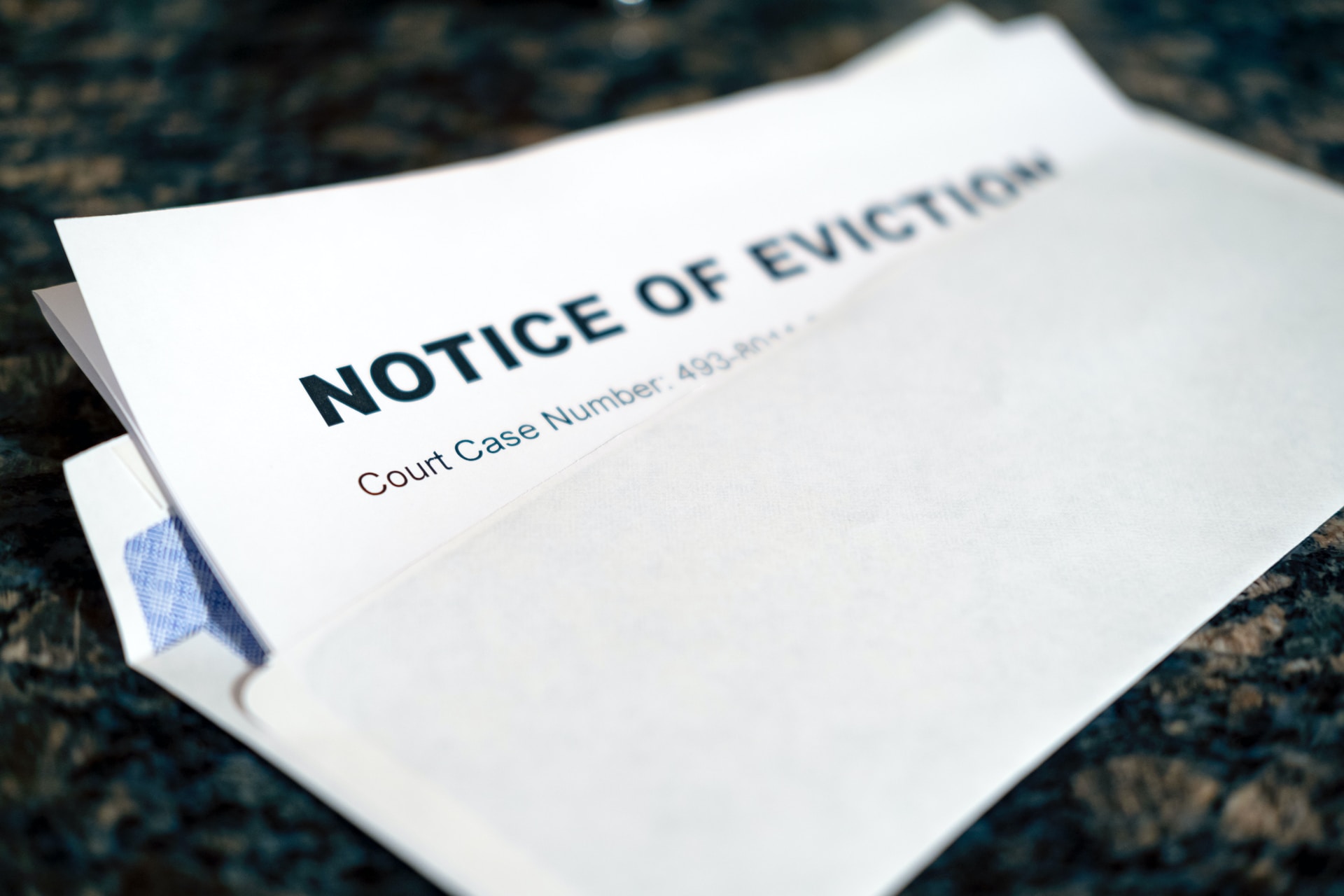

Finance
How Does Eviction Show On Credit Report
Published: October 20, 2023
Learn how eviction impacts your credit report and financial standing. Find out what steps you can take to mitigate the effects and protect your finances.
(Many of the links in this article redirect to a specific reviewed product. Your purchase of these products through affiliate links helps to generate commission for LiveWell, at no extra cost. Learn more)
Table of Contents
Introduction
A credit report is an essential document that provides a detailed summary of an individual’s credit history. It includes information about their borrowing and repayment habits, such as credit card payments, loans, and other financial transactions. Lenders, landlords, employers, and even insurance companies use credit reports to assess an individual’s creditworthiness and make informed decisions.
Unfortunately, financial difficulties and unforeseen circumstances can sometimes lead to eviction from a rental property. An eviction occurs when a tenant is legally forced to move out of the property due to non-payment of rent, violating lease terms, or other lease violations. This eviction not only disrupts the tenant’s living situation but can also have long-lasting consequences on their credit report.
In this article, we will explore how evictions are reported on credit reports, the impact they can have on credit scores, how long they stay on a credit report, and whether or not they can be removed. We will also provide some tips on how to minimize the effects of evictions on your credit.
What is a Credit Report?
A credit report is a comprehensive record of an individual’s credit history. It is compiled by credit bureaus and contains information about their financial behavior and creditworthiness. Lenders, landlords, and other entities use credit reports to determine an individual’s risk level when considering a loan, rental application, or other financial transactions.
Typically, a credit report includes the following information:
- Personal Information: This includes your name, address, social security number, date of birth, and employment history.
- Account Information: This section lists all your credit accounts, including credit cards, loans, mortgages, and any other lines of credit. It includes details such as the account balance, payment history, and credit limit.
- Public Records: This section includes any court judgments, tax liens, bankruptcies, or other legal actions related to your financial history.
- Inquiries: This section shows a list of entities that have requested your credit report. There are two types of inquiries: soft inquiries (such as when you check your own credit report) and hard inquiries (such as when a lender checks your credit during a loan application).
It’s important to note that credit reports are maintained by several credit bureaus, including Experian, Equifax, and TransUnion. Each bureau may have slightly different information, so it’s crucial to review reports from all three bureaus to ensure accuracy and completeness of the information.
Regularly checking your credit report is essential to identify any errors or fraudulent activity that could negatively impact your creditworthiness. By monitoring your credit report, you can take appropriate measures to correct inaccuracies and maintain a healthy credit profile.
What is Eviction?
Eviction is a legal process in which a landlord removes a tenant from a rental property. This occurs when the tenant breaches the terms of the lease agreement, fails to pay rent, or engages in behavior that violates the rental contract.
The process typically begins with the landlord serving the tenant with an eviction notice, which states the reason for the eviction and provides a specified period for the tenant to rectify the situation or vacate the premises. If the tenant fails to comply with the notice, the landlord can file a lawsuit to obtain a court order for eviction.
Evictions can happen due to various reasons, such as non-payment of rent, property damage beyond normal wear and tear, unauthorized subletting, or engaging in illegal activities on the property. Each country or state has its own laws and regulations regarding eviction, outlining the rights and responsibilities of landlords and tenants.
It’s important for both landlords and tenants to understand their legal obligations and rights to avoid potential eviction situations. Landlords generally need to follow proper procedures and provide sufficient evidence of lease violations or non-payment of rent to successfully carry out an eviction.
For tenants, eviction can have severe consequences, such as the loss of their home, difficulty finding new rental accommodations, and potential damage to their credit report. Understanding their rights as tenants and fulfilling lease obligations can help prevent eviction and maintain a positive rental history.
How are Evictions Reported on Credit Reports?
When an eviction occurs, it can have a significant impact on an individual’s credit report and overall creditworthiness. The reporting of evictions on credit reports can vary depending on the country or region, as well as the policies of credit reporting agencies.
In the United States, for instance, eviction is not typically reported directly to the credit bureaus unless it results in a legal judgment against the tenant. When a landlord obtains a court judgment for eviction, it may be reported as a public record on the tenant’s credit report.
Once reported, an eviction judgment can remain on the credit report for up to seven years. This negative information can be visible to potential lenders, landlords, and employers who review the individual’s credit report during the application process.
In some cases, landlords may also report past due rent or lease violations to collection agencies. If such debts are sent for collection and subsequently reported to the credit bureaus, they can appear as negative items on the tenant’s credit report and further impact their credit score.
It’s important to note that not all landlords or rental management companies report eviction actions or unpaid rent to credit bureaus. However, the prevalence of reporting may vary based on local laws, the landlord’s policies, and their relationship with credit reporting agencies.
When an eviction is reported on a credit report, it can significantly damage an individual’s credit score. This can make it more challenging to qualify for loans, secure rental housing, or even obtain certain employment opportunities that require a good credit standing.
It’s crucial for individuals to be proactive in understanding their rights and responsibilities as tenants, paying rent on time, and resolving any disputes or lease violations promptly. Developing a positive rental history and maintaining a good credit profile are key to minimizing the impact of evictions on credit reports.
Impact of Evictions on Credit Scores
An eviction can have a significant negative impact on an individual’s credit score. Credit scores are numerical representations of a person’s creditworthiness and are used by lenders and creditors to assess the risk of lending to or extending credit to an individual.
When an eviction appears on a credit report, it can result in a substantial drop in the individual’s credit score. The exact impact will vary depending on various factors, including the individual’s overall credit history, the severity of the eviction, and the presence of any other negative items on the credit report.
An eviction can lead to multiple negative consequences for credit scores:
- Lower Credit Score: An eviction can significantly lower a person’s credit score, making it more challenging to qualify for future loans or credit.
- Inability to Obtain New Credit: Lenders may be hesitant to approve credit applications from individuals with a history of eviction, making it difficult to obtain new credit lines or loans.
- Higher Interest Rates: Even if individuals with evictions manage to secure credit, they may face higher interest rates due to the increased risk perceived by lenders.
- Difficulty Renting: When applying for new rental accommodations, landlords often check credit reports. Evictions on the credit report can make it challenging to find a new place to live.
- Employment Challenges: Certain employers may review an individual’s credit report during the hiring process, especially for positions that involve financial responsibilities. Evictions on the credit report could raise concerns for potential employers.
It’s important to note that the impact of an eviction on a credit score may lessen over time as the eviction becomes older and is replaced by more recent positive credit behaviors. However, it can still take several years for the negative impact to diminish significantly.
It’s crucial for individuals who have experienced eviction to take proactive steps to improve their credit profile. This includes timely bill payments, reducing outstanding debt, and building a positive credit history over time. By doing so, individuals can work towards improving their credit scores and overcoming the negative consequences of eviction.
How Long Does an Eviction Stay on a Credit Report?
The duration for which an eviction stays on a credit report can vary depending on the country or region and the policies of credit reporting agencies. In the United States, an eviction judgment can remain on a credit report for up to seven years from the date it was filed in court.
It’s important to note that the clock starts ticking from the date of the court judgment, not from the date of the actual eviction. This means that even if a tenant has moved out of a property before the court judgment, the eviction can still appear on their credit report for the specified time period.
After the seven-year period has elapsed, the eviction should automatically be removed from the individual’s credit report. It is important to regularly review credit reports to ensure that inaccurate or outdated information, such as an eviction beyond the seven-year mark, is not negatively impacting the credit profile.
It’s worth noting that evictions that result in a monetary judgment against the tenant, such as unpaid rent or damages, can have an even longer impact on credit reports. In some cases, these judgments may remain on the credit report for up to ten years, further affecting creditworthiness.
It’s important to remember that while the eviction may no longer be listed on the credit report after the designated time period, it may still have lingering effects. Some landlords and rental management companies may keep a record of prior evictions for reference during tenant screenings, potentially making it more challenging to secure future rental accommodations.
It’s crucial for individuals who have experienced eviction to focus on rebuilding their credit profile over time. By demonstrating responsible financial behavior, making timely payments on existing credit accounts, and developing a positive credit history, individuals can work towards improving their creditworthiness and mitigating the long-term impact of an eviction on their credit report.
Can Evictions be Removed from a Credit Report?
The process of removing an eviction from a credit report can be challenging, but it is not impossible. It’s important to note that accurate and verifiable information cannot be removed from a credit report. However, there are instances where inaccuracies or errors may occur that can warrant their removal.
If the eviction information on the credit report is inaccurate or incomplete, individuals have the right to dispute it with the credit reporting agencies. The Fair Credit Reporting Act (FCRA) provides consumers with the ability to request investigations into the accuracy of information on their credit reports.
To initiate a dispute, individuals should contact the credit reporting agency, either online or in writing, and provide documentation or evidence to support their claim. The agency will then investigate the disputed information and will either correct it or uphold its accuracy. If the eviction information is found to be incorrect or cannot be verified, it should be removed from the credit report.
It’s important to note that the disputed eviction information may temporarily remain on the credit report during the investigation process. However, if it is found to be inaccurate, it should be permanently removed.
Aside from disputing inaccurate information, there is no guaranteed method for removing accurate evictions from a credit report before the designated time period. The seven-year time frame, or ten years in the case of monetary judgments, is generally adhered to by credit reporting agencies.
However, individuals can work towards improving their overall credit profile by focusing on positive financial behaviors. Paying bills on time, reducing debt, and developing a positive credit history over time can help mitigate the negative impact of an eviction on creditworthiness.
It’s crucial to monitor credit reports regularly to ensure accurate and up-to-date information is being reported. By staying vigilant and taking proactive steps to improve credit, individuals can work towards rebuilding their creditworthiness and minimizing the impact of past evictions on their credit report.
How to Minimize the Effects of Evictions on Credit
While it may be challenging to completely erase the effects of evictions on credit, there are steps individuals can take to mitigate the impact and work towards improving their creditworthiness. Here are some strategies to consider:
- Monitor and dispute inaccuracies: Regularly review your credit reports from all three major credit bureaus (Experian, Equifax, and TransUnion) to ensure accuracy. If you spot any inaccuracies related to the eviction, such as incorrect dates or personal information, immediately dispute them with the credit reporting agencies.
- Develop a positive credit history: Focus on building a positive credit history by making all your future payments, such as credit cards, loans, and utilities, on time. Consistently paying bills on time helps to reestablish trust and shows future lenders or landlords your commitment to responsible financial behavior.
- Establish new positive credit accounts: If possible, open new credit accounts and make timely payments to demonstrate your ability to handle credit responsibly. Secured credit cards or small loans can be helpful in rebuilding your credit, but be sure to use them responsibly and not take on more debt than you can handle.
- Communicate with future landlords: When applying for new rental accommodations, be upfront about your past eviction. Explain the circumstances, highlight any steps taken to rectify the situation, and provide references from current or previous landlords who can speak to your responsible tenancy.
- Consider a co-signer or rental guarantor: If you’re having trouble securing rental accommodation due to your eviction history, you may want to consider having a trusted friend or family member co-sign the lease or act as a rental guarantor. This can provide reassurance to the landlord that the rent will be paid on time.
- Save for a larger security deposit: Some landlords may be more willing to overlook a past eviction if you’re able to offer a larger security deposit. Saving up a significant amount to put towards the deposit can give landlords a sense of security and reduce their concerns about potential financial risks.
- Seek professional credit counseling: If you’re struggling with managing your finances or have difficulty understanding credit reports, consider seeking assistance from a reputable credit counseling agency. They can provide guidance on managing debt, budgeting, and rebuilding credit.
- Show stability in employment and housing: Building a stable employment history and establishing long-term housing stability can also help mitigate the impact of evictions on credit. Lenders and landlords may view individuals with consistent employment and residential stability as lower-risk borrowers.
Remember, rebuilding credit takes time and patience. It’s important to be consistent with positive financial behaviors and avoid any new negative marks on your credit report. Over time, the impact of the eviction on your credit will lessen, and you can begin to rebuild your creditworthiness.
Conclusion
Evictions can have a detrimental impact on an individual’s credit report and overall creditworthiness. While evictions are not directly reported on credit reports in all cases, they can still have long-lasting effects on an individual’s financial future.
It’s important to understand that evictions can result in negative items being reported on credit reports, such as court judgments or unpaid rent being sent to collections. These can significantly lower credit scores and make it difficult to qualify for future loans, rental properties, or even employment opportunities.
While it can be challenging to remove accurate evictions from credit reports before the designated time period, individuals can take proactive steps to minimize the effects of evictions on their credit. Regularly monitoring credit reports, disputing inaccuracies, and consistently practicing responsible financial habits can help rebuild creditworthiness over time.
Additionally, open communication with future landlords, establishing stable employment and housing history, and considering alternative options such as co-signers or larger security deposits may improve the chances of securing new rental accommodations.
Remember, rebuilding credit takes time and persistence. By demonstrating responsible financial behaviors, individuals can gradually improve their creditworthiness and work towards a brighter financial future, even in the face of past evictions.
It’s important to stay proactive, seek professional guidance when needed, and remain committed to a healthy financial journey. With the right strategies and a focus on positive financial habits, individuals can overcome the challenges posed by evictions and work towards achieving their financial goals.














